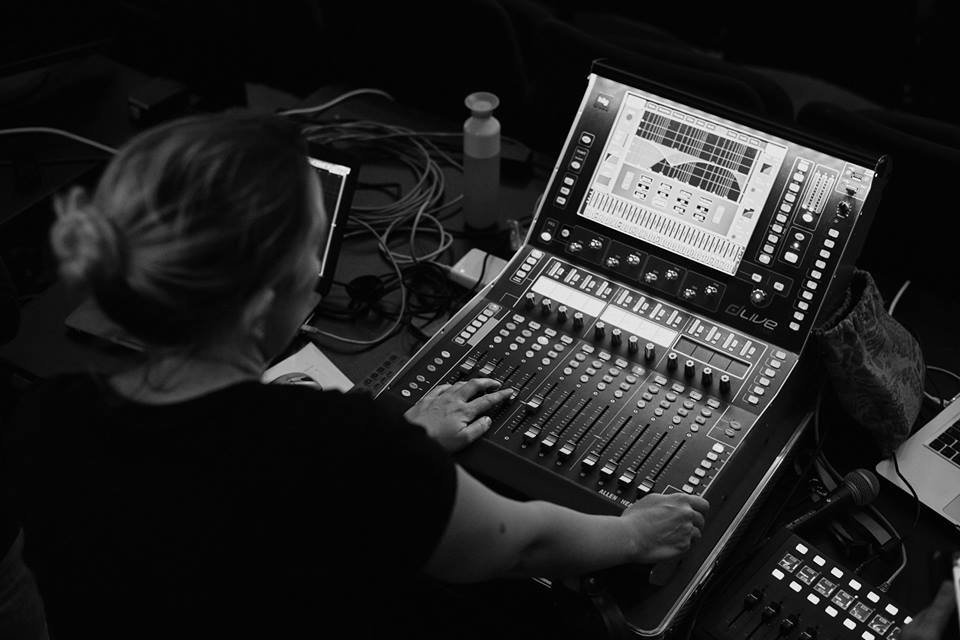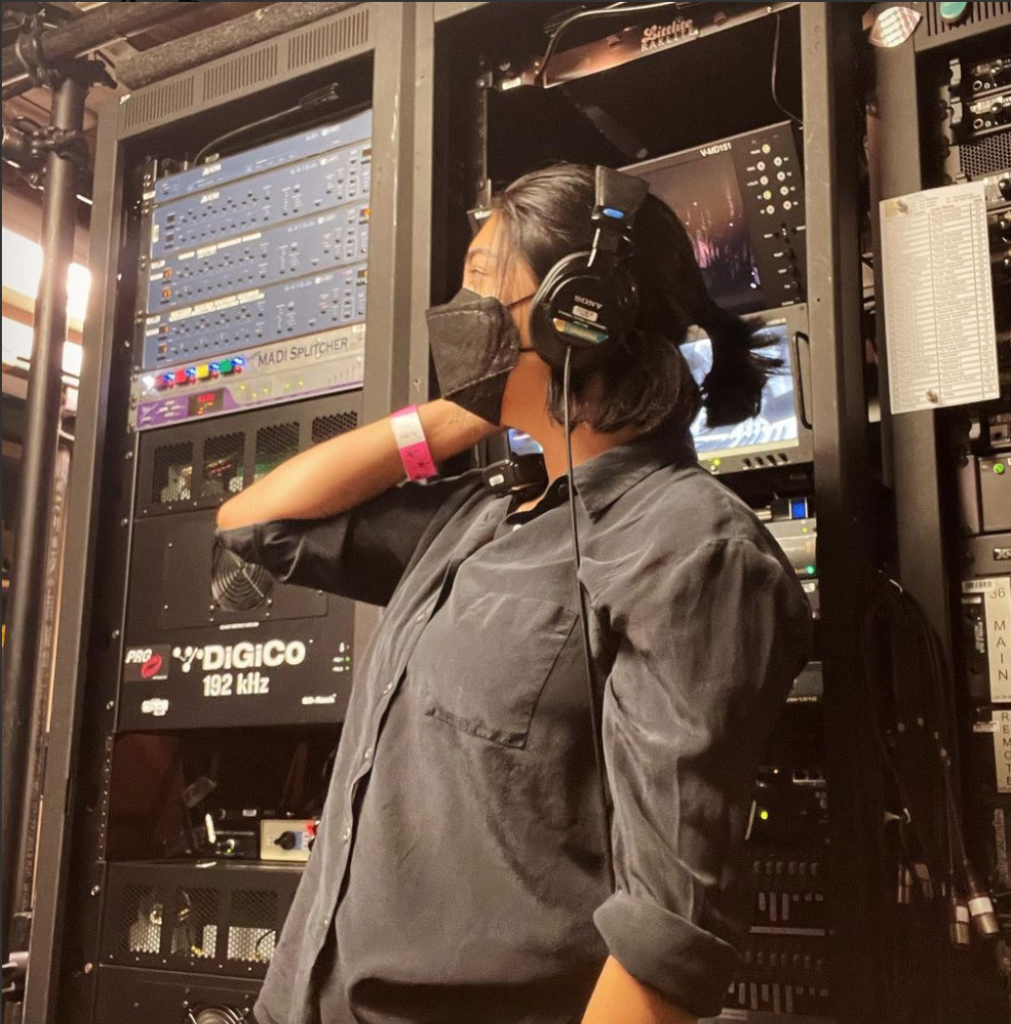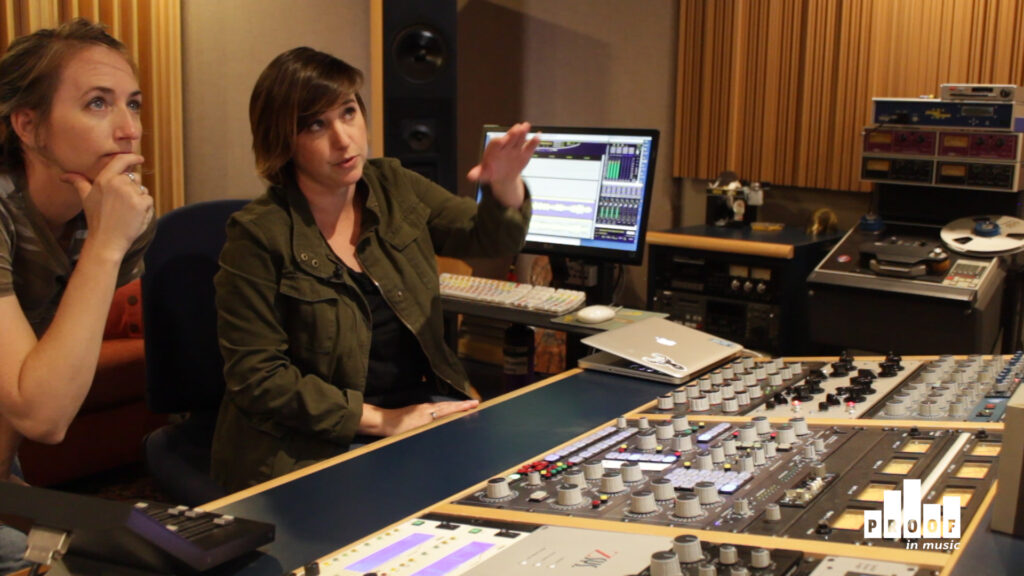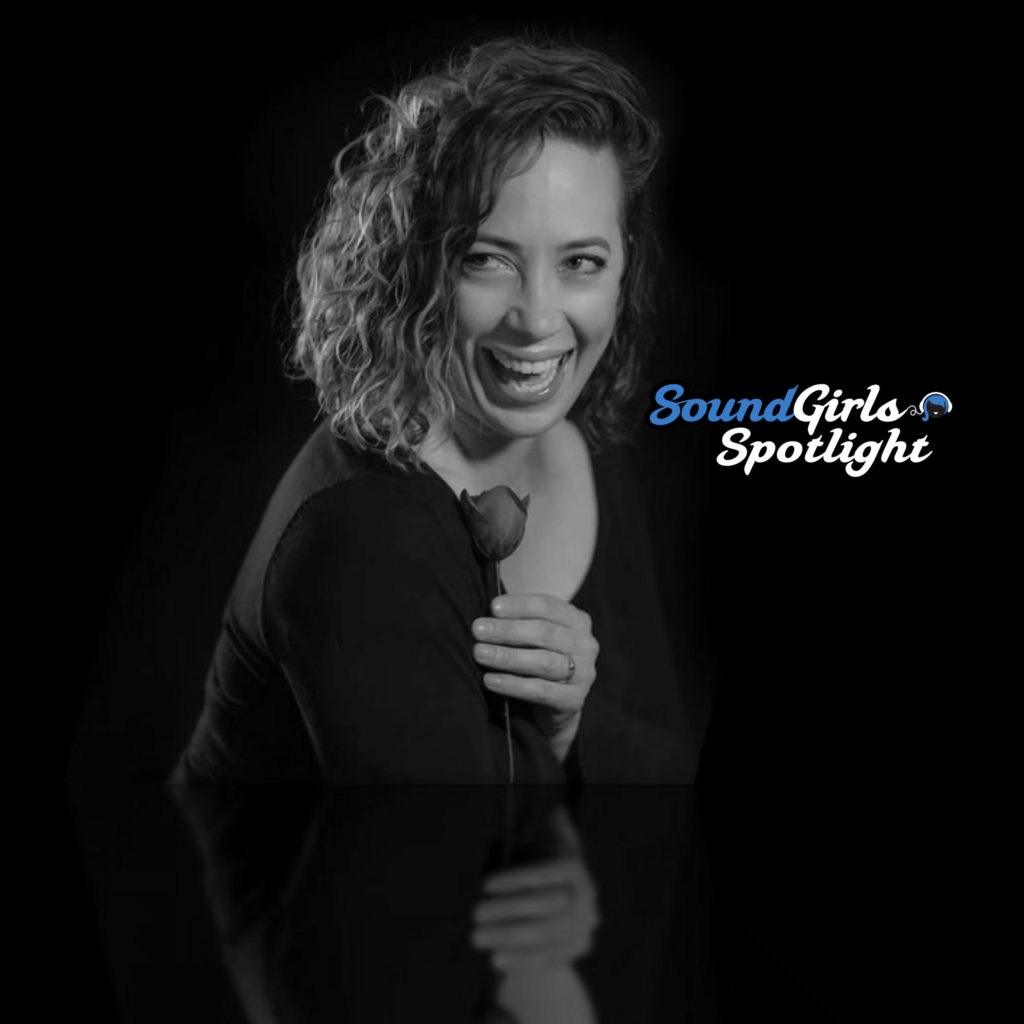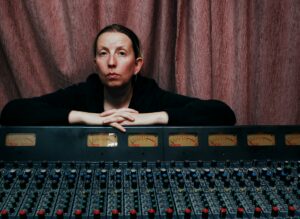 Petra Randewijk is an independent sound engineer based in The Netherlands. Petra has been working in audio for 21 years, and she is currently on tour with Imogen Heap as the FOH Engineer. The world tour is heading to the U.S. & Canada in May and June.
Petra Randewijk is an independent sound engineer based in The Netherlands. Petra has been working in audio for 21 years, and she is currently on tour with Imogen Heap as the FOH Engineer. The world tour is heading to the U.S. & Canada in May and June.
Petra originally got interested in studio sound, while recording a demo with a band she played in when she was fifteen. “I wasn’t the best musician and didn’t enjoy a lot of what being a musician is about, like standing on a stage with people staring at me, but being in the studio sparked something. I wanted to study music technology to get a job in a studio, but didn’t get in at first try, so to gain some experience I decided to try and do some live work, or at least try and have people explain to me how all the sound equipment works.”
She would go on to study music technology and graduated as a composer for theatre and dance. She would learn live sound by just doing it, and while she wanted to go into the recording side, she would find the excitement of live sound addictive.
“I got my start at with a local PA company who provided sound for the local venues where I went to see bands and also played as a musician. They had an anarchistic way to organise themselves and a focus on equipment, to build it, repair it and take it apart in general for educational purposes or just the fun of it. What I learned there was that there is not one way of doing things, and whatever you do, it’s never good enough.”
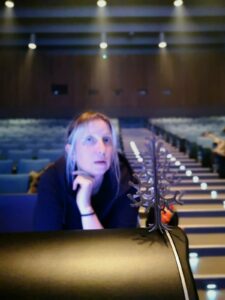 Petra has in the past worked with international touring band Jungle by Night, a nine-piece Dutch instrumental band.
She also works with other Dutch groups and occasionally will take on the role of TM/FOH. When she is not on the road, she works at Doornroosje in Nijmegen and with local sound companies, where she will take on the roles of FOH, Monitors, Patch whatever needs to be done.
Petra has in the past worked with international touring band Jungle by Night, a nine-piece Dutch instrumental band.
She also works with other Dutch groups and occasionally will take on the role of TM/FOH. When she is not on the road, she works at Doornroosje in Nijmegen and with local sound companies, where she will take on the roles of FOH, Monitors, Patch whatever needs to be done.
She also owns a small studio “where I record a mixture of bands in different styles. Doing this also helps me for live shows because, in the studio, there is way more time to talk with and understand musicians and how they feel about their sound. In live sound, it’s tough to do that, as musicians can never hear the end result of what you are doing during a show. So the conversation is always about hearsay or at the best you discuss in vague terms what we are doing. And I do believe this can help to better amplify and put across artist creativity and emotion, which is in the end what I think doing sound is all about.”
On the current Imogen Heap Tour, which is a mix of live shows, talks, workshops, and exhibition for Creative Passport, this is a different way to tour and Petra shares with us what life is like.
Yes, it’s indeed a bit of a weird one, compared to what people might be used to for touring. But for me, it keeps it interesting, and it is never dull. A week (sometimes shorter) differs in every city. It is done this way, because the tour is also set up to showcase the Creative Passport, and on the road talk to music makers all over the world on their point of view and needs on this. Creative Passport is the digital container to hold verified profile information, IDs, acknowledgments, works, business partners and payment mechanisms, to help get music makers and their works, linked and open (data) for business.
We also have Mi.Mu glove presentations, tech talk ones. For this, we use part of the same setup as in the shows. These talks are informative because Imogen explains how the things she does with the gloves actually work. This is a good talk which was recorded, and it also discusses Creative Passport.
My main focus as a sound engineer are the live shows, which are with Imogen, Guy Sigsworth, and four other excellent musicians on stage playing guitar, drums, cello, and keytar. The setlist contains Imogen Heap songs and Frou Frou songs.
The basis of the setup for the live shows is an A&H Dlive mix rack, which has a Madi card to communicate with Imogen’s computer through optical Madi and an RME madiface. It sends audio to Imogen which she can process, such as vocal, but also other instruments. It receives 20 input channels, as well. The full input list is 32 channels, and ambient mics, and all channels are split into FOH and Monitor channels. All musicians are on in-ears, and they take care of their own monitor setup with the help of an iPad app. This took a bit of getting used too, but we used the setup at all the pre-production rehearsals.
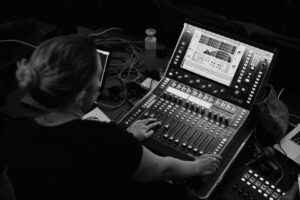 Whenever possible, we are sponsored by d&b to use Soundscape. For this, I added a Dante card in the Mixrack to send all channels. Soundscape is d&b’n new immersive sound system and amazing to work with. It can make everything sound very natural like its directly coming from where the musicians are standing. But there is also a whole new world to be discovered, the possibilities to use it for effects and electronic sounds. That makes it so much fun. And because it receives OSC to control the sound objects, Imogen can directly move sounds in the room with her Mi.Mu gloves.
Whenever possible, we are sponsored by d&b to use Soundscape. For this, I added a Dante card in the Mixrack to send all channels. Soundscape is d&b’n new immersive sound system and amazing to work with. It can make everything sound very natural like its directly coming from where the musicians are standing. But there is also a whole new world to be discovered, the possibilities to use it for effects and electronic sounds. That makes it so much fun. And because it receives OSC to control the sound objects, Imogen can directly move sounds in the room with her Mi.Mu gloves.
There are intimate evenings with Imogen Heap, which are only for the people who helped start up this tour from day one as an enabler. There she talks about her songs and then plays using just a grand piano and vocal. The audience can ask for their favorite songs to be played, which makes the shows different every time.
Heap’s live shows feature both solo performances by the artist, as well as an electronic duo with Frou Frou collaborator Guy Sigsworth. The tour is also the first to showcase Heap’s innovative Mi.Mu gloves.
Can you explain the Gloves?
The Mi.Mu gloves are controllers. They come with excellent software that registers hand postures, movement, and relative location. With them, and the software, you can control everything you could want. It can output MIDI and OSC, and you can connect it to anything compatible. Imogen controls all the music that comes from her computer, running Ableton. They can do starts and stops, make drum loops, scroll through samples, as well as control effects as loops, harmonizers, delays, and reverb. Anything, is possible, although, it is the same as with other instruments, it does get complicated to keep track of all the movements you need to do. It’s always awe-inspiring to watch Imogen do all that.
You are touring with d-Live and Soundscape. Are you touring with other production?
We are traveling with a Dlive rack, but still, need to get the surface locally supplied. We get great touring support on this from A&H and d&b is sponsoring Soundscape, whenever possible. Other than that, I am carrying a set of mixed microphones and DI’s. Nothing big, just my personal favorites.
Working with an artist like Imogen, who is at the forefront of new technology for music and musicians, both in helping to develop it and/or using it, makes it possible and maybe even needed to keep looking for new ways to make things easier and/or better. So I am now working to check if we can integrate KLANG’s 3D monitoring system in the setup, and using it to follow the glove movements.
This keeps me challenged to keep learning and trying out new things all the time, which for me makes this tour amazing.
How large is the crew for the show?
As for the crew, we are traveling with Imogen’s PA, a Nanny, the Mycelia head of operations, who also helps with the show setup, me, and a backline tech/general tech/driver. We all have a bit of a mixed-function description, as Imogen’s PA and the Mycelia head of operation also shares TM duties. My function besides sound is also PM. And one of the musicians also helps out with production and does the stage design. In general, we all make sure that everything that needs to be done gets done.
What do you like best about touring?
I love seeing new places and meeting wonderful people everywhere. And that every day is different. I feel I am at my best when everything has to be done on the spot, and maybe even is a bit chaotic. I sometimes even find myself thriving in chaos. (And smiling in the middle of it)
What do you like least?
Hanging around at airports.
What is your favorite day off activity?
Doing some touristy stuff, seeing the surroundings. Trying local food, when there is a vegetarian option available.
What if any obstacles or barriers have you faced?
The sound world is tough in general, and you do need to have a thick skin. I started at the end of the nineties when everything seemed even a bit rougher. More yelling, more making fun of people mistakes and all was never good enough. Being slightly insecure already, this didn’t help me. I can’t tell for sure if it was especially harder because I was a woman, I did get all the ‘you aren’t rock n’ roll enough’ ‘are you the sound guy’s girlfriend’ ‘this sounds rather good, did your boyfriend mix it’ and more of that stuff. It’s all small stuff, but together, it’s a constant reminder that I am less trusted by sight as my male colleagues. But to be honest, I had the same lack of trust in myself, so I may have been my biggest obstacle.
I didn’t meet a lot of women doing sound in the first ten years, so everything seemed personal instead of about gender, which maybe made it harder to get around it.
But I know I’ve seen a lot of guys leave as well.
How have you dealt with them?
I made it through the first part by being stubborn. Taking all the crap and just kept on going. Also, I didn’t know that there was any other option. After a while, people gave me more responsibility and opportunities to do things on my own, and in my own way, which worked better for me.
One day I decided I wasn’t going to take being yelled at from anyone anymore. So I started talking back, asking why people thought it is okay to do that, or stopped working with people and at places that got me down. I just found the best space for me. It took a lot of years to get to this point. Realising at least some of it wasn’t personal really helped me, and a place like SoundGirls is amazing to discover that. The SoundGirls community also told me to stop complaining about needing to know twice as much as my average male colleagues to be taken equally seriously. But just go for it.
In the end, gaining knowledge is never a waste. So I am still trying to learn as much as possible. Taking courses, asking questions, learning every day.
Advice you have for other women and young women who wish to enter the field?
Don’t forget things are rarely personal. Things people say are more about themselves as they are about you. Having said that doing sound is also never about you, but about the music being made on stage. And how to bring that to the audience as much as it is intended to be.
And if you lose a gig, don’t dwell on it, there are always more gigs, and sometimes it’s just someone else’s time. The best way to deal with this is to keep going and get other gigs, preferably things that fit especially for you. But to establish that you mustn’t be afraid to take an honest look at yourself too. And never forget to stay your own person in the whirlwind off the rock and roll, it’s the best person you can be.
Never forget to broaden your musical horizon, because if you work in sound, this can never be wide enough. Every kind of music has his own sound ideas and sometimes even rules. And every new thing you discover can give you new information you might be able to use in the next show. So don’t be afraid to listen to music outside of your comfort zone.
Must have skills?
Stubbornness, patience, always staying relaxed, and a lot of curiosity.
Favorite gear?
For live, I am at the moment pleased with my d-live rack and the Allen and Heath d-live series in general. If I could bring one thing, this would be it. It has amazing possibilities with getting audio in lots of directions. Great sounding internal fx and compressors, and very easily flyable. And also very useful to do recording sessions on location. For in the studio, my favourite piece of gear is a Schoeps MK4 microphone, which makes everything it records sounds amazing.
